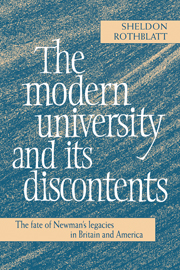Book contents
- Frontmatter
- Contents
- Preface
- 1 The idea of the idea of a university and its antithesis
- 2 ‘Consult the Genius of the Place’
- 3 ‘The first undergraduates, recognizable as such’
- 4 Failure
- 5 Historical and comparative remarks on the ‘federal principle’ in higher education
- Interlude: General introduction to Chapters six and seven
- 6 Supply and demand in the writing of university history since about 1790: 1. ‘The awkward interval’
- 7 Supply and demand in the writing of university history since about 1790: 2. The market and the University of London
- 8 Alternatives: 1. The importance of being unattached
- 9 Alternatives: 2. Born to have no rest
- Index
8 - Alternatives: 1. The importance of being unattached
Published online by Cambridge University Press: 02 December 2009
- Frontmatter
- Contents
- Preface
- 1 The idea of the idea of a university and its antithesis
- 2 ‘Consult the Genius of the Place’
- 3 ‘The first undergraduates, recognizable as such’
- 4 Failure
- 5 Historical and comparative remarks on the ‘federal principle’ in higher education
- Interlude: General introduction to Chapters six and seven
- 6 Supply and demand in the writing of university history since about 1790: 1. ‘The awkward interval’
- 7 Supply and demand in the writing of university history since about 1790: 2. The market and the University of London
- 8 Alternatives: 1. The importance of being unattached
- 9 Alternatives: 2. Born to have no rest
- Index
Summary
HERMIT CRABS
Some scenarios of the future may be compared to the surrealistic picture of the university as a shell into which homeless hermit crabs crawl seeking temporary shelter and affiliation. Some are gypsy scholars in high demand. A second set is composed of employees seeking part-time, contractual work in a secondary labour market, unionised perhaps on an industrial, conflict model. The third group appears consisting of large support staffs and non-professorial researchers, sometimes professional, sometimes semi-professional and at other times skilled or unskilled labour. And then of course there are students of every type, building various forms of association with the university, some lasting and sentimental, others routinely utilitarian. Most students today are ‘mature’. They are busy with jobs and families. Many take their education at a distance, others journey to ‘subway colleges’. Newman had a vision of such a world of hesitant university attachments. He could hardly have imagined the varieties of communities and non-communities emerging by the end of another century. For him, the university was such an enclosed and singular institution that a humble snapdragon, struggling to root itself in stone, was enough to stimulate memory and suggest experiences.
The university as a shell is a wild and irresponsible metaphor, but it vividly captures aspects of today's higher education world. The phenomenon of entrance and exit is highly pronounced in America. It is becoming so elsewhere, or is already so advanced, as in Austria and Italy, that tracking the record of students has become a problem and even a scandal.
- Type
- Chapter
- Information
- The Modern University and its DiscontentsThe Fate of Newman's Legacies in Britain and America, pp. 386 - 413Publisher: Cambridge University PressPrint publication year: 1997



